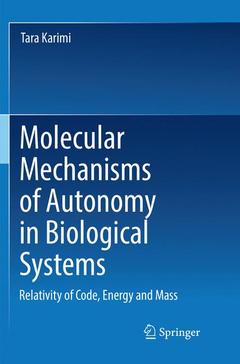Molecular Mechanisms of Autonomy in Biological Systems, 1st ed. 2018, Corr. 2nd printing 2018 Relativity of Code, Energy and Mass
Auteur : Karimi Tara

Dr. Tara Karimi has devoted her academic career to studying biological systems and applying the natural principles to create abiologically-inspired technology which mimics autonomous properties of biological systems. Dr. Karimi started her research in veterinary medicine and from there ventured into biochemistry. The introduction to biochemistry was the onset of her journey into multidisciplinary science. She went on to complete several projects in tissue and genetic engineering, molecular and developmental biology, stem cell research and regenerative medicine. This broad exposure and passion for the chemistry of living systems allowed Tara to connect the dots in biology and chemistry to pioneer what she calls Cognitive Chemistry. Dr. Karimi received her Doctorate in Veterinary Medicine and a Ph.D. in Biochemistry from Shiraz University. Furthermore, she obtained a Postdoc in Tissue Engineering from the University of South Carolina and another Postdoc in Stem Cell Programming from Tulane University.
Provides a novel molecular description for self-organization and autonomy in biological systems
Shows how this new approach can impact stem cell & regenerative medicine and cancer research
Authored information is provided in one cohesive voice and presentation
Date de parution : 01-2019
Ouvrage de 134 p.
15.5x23.5 cm
Disponible chez l'éditeur (délai d'approvisionnement : 15 jours).
Prix indicatif 116,04 €
Ajouter au panierDate de parution : 11-2018
Ouvrage de 134 p.
15.5x23.5 cm
Disponible chez l'éditeur (délai d'approvisionnement : 15 jours).
Prix indicatif 158,24 €
Ajouter au panier


